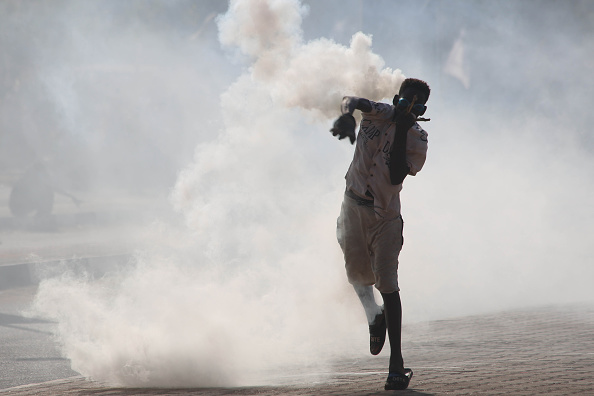Khartoum – Sudan’s security forces fired tear gas on Thursday at protesters demanding justice for 79 people killed following a military coup, as a rights group released details documenting the “lethal force” used in the crackdown.
More than three months after the October 25 takeover led by General Abdel Fattah al-Burhan in the troubled northeast African country, defiant mass rallies demanding a restoration of the transition to civilian rule show few signs of abating.
In the capital Khartoum, protesters used rocks to build makeshift barriers blocking roads, while across the Nile river in North Khartoum, crowds of over 2,000 people chanted slogans against the security forces.
Security forces fired volleys of tear gas to disperse the crowds.
In Omdurman, the capital’s twin city, some 5 000 people gathered outside the home of 27-year-old Mohammed Yussef, a protester killed after he was shot in the chest during rallies on Sunday.
ALSO READ | Sudanese anti-coup protester killed in security crackdown
The coup, one of several in Sudan’s post-independence history, derailed a fragile power-sharing arrangement between the army and civilians that had been painstakingly negotiated after the 2019 ouster of longtime autocrat Omar al-Bashir.
At least 79 people have been killed and hundreds wounded in the crackdown on anti-coup demonstrations, according to the independent group of medics.
As crowds chanted on the streets, Burhan met in Khartoum with United Nations special representative Volker Perthes, with the envoy urging him “to end the violence that accompanies the demonstrations”, according to state media.
The UN, which has launched talks between factions in a bid to resolve the crisis, has constantly warned the authorities against using force to stop political protests.
Activists have called for further protests with rallies planned for Saturday and Monday.
‘No warning’
Sudan’s authorities have repeatedly denied using live ammunition against demonstrators, reporting scores of security officers have been wounded and a police general was stabbed to death.
However, the authorities said they had recently “confiscated” rifles from some officers who were seen using them in videos circulating on social media.
But Human Rights Watch (HRW) on Thursday said that security forces at rallies last month had “used live ammunition against unarmed protesters”, reporting that anti-riot police had also “fired tear gas canisters directly at protesters at the front of the march.”
HRW said it had detailed violence that took place on January 17 when at least eight protesters were killed, the second deadliest day since the coup.
ALSO READ | Sudan frees medics held in crackdown on anti-coup protests
One 26-year-old protester told HRW how police fired the metal tear gas canisters at people, which can cause severe injury at close-quarters.
“As we retreated to find cover from the tear gas, I was hit in the back by a canister,” the protester told HRW. “I also saw two other protesters being hit in the head and chest.”
Another protesters reported that “there was no warning nor provocation from our side” before police opened fire.
Sudan, which was already in the grip of a dire economic crisis before the coup, has seen vital foreign aid cut as part of the international community’s condemnation of the takeover.
Washington, which suspended $700 million in assistance to Sudan after the coup, has warned that a continued crackdown by the authorities would have “consequences”.
ALSO READ | Sudan deputy leader meets Ethiopia defence minister on rare visit
On Tuesday, US Assistant Secretary of State Molly Phee said she had “made clear to military leaders, we in concert with our partners are prepared to apply additional costs should the current pattern of violence continue”.
The United States was “reviewing the full range of traditional and non-traditional tools at our disposal to further reduce the funds available to Sudan’s military regime”, she added.
Sudan’s military controls vast business enterprises, ranging from poultry farming to construction.
Phee said the US planned “to isolate its military-controlled companies, and to increase the reputational risk for any who choose to continue to engage in ‘business-as-usual’ with Sudanese security services”.
Follow African Insider on Facebook, Twitter and Instagram
Source: AFP
Picture: Getty Images
For more African news, visit Africaninsider.com


